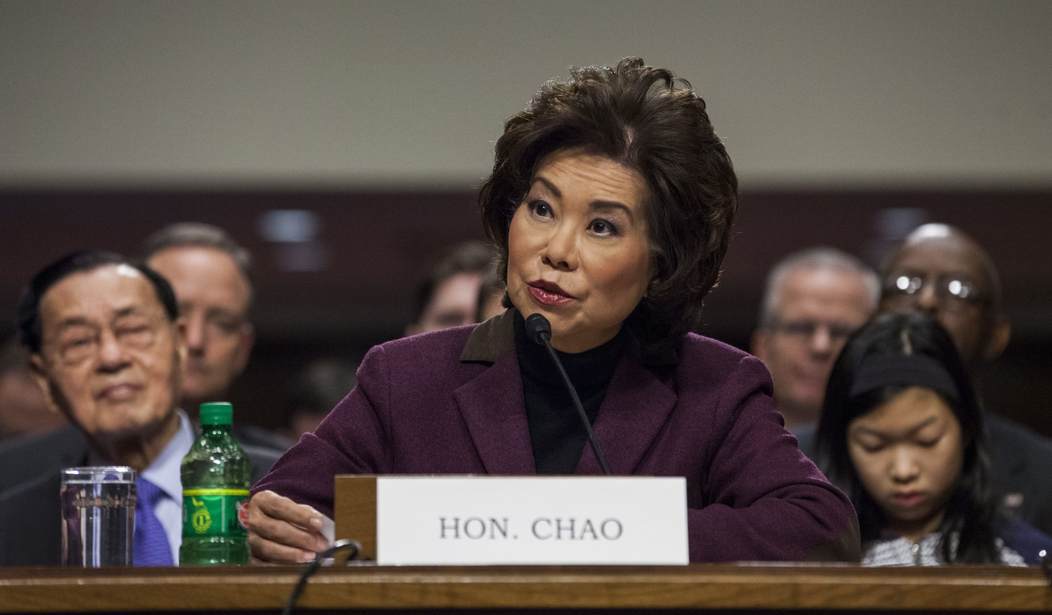If there is anything upon which President-elect Donald Trump, Transportation Secretary nominee Elaine Chao and Sen. Bill Nelson of Florida agree, it is that the nation’s infrastructure is crumbling from age and lack of repair.
“Many of our roads, bridges, tunnels and rails are aging and desperately need to be repaired or replaced,” said Nelson, the ranking Democrat on the Senate Commerce, Science & Transportation Committee, today at the opening of Chao’s confirmation hearing.
“Years of neglect and increased demand have brought us to a point where we can no longer sit idly by and watch our country’s most critical infrastructure continue to deteriorate,” Nelson added.
Elizabeth Chao’s nomination to become the 18th U.S. Transportation secretary is expected to be approved with very few fireworks. Members of the Senate Commerce, Science & Transportation Committee appear to love her.
Chao was the first Asian-American woman to be appointed to a president’s cabinet when she served as Labor secretary in the administration of George W. Bush.
Chao was also director of the Peace Corps; she established the first programs in the newly liberated Baltic nations and the independent states of the former Soviet Union.
She served as deputy secretary at the U.S. Department of Transportation, chairman of the Federal Maritime Commission, deputy Maritime administrator, and White House fellow.
Sen. Roy Blunt (R-Mo.) said Chao is probably the only person confirmed by the Senate for four different government positions without a single dissenting vote.
Beyond her resume, all of the senators on the committee are intimately familiar with the man who controls much of their destinies, Chao’s husband Senate Majority Leader Mitch McConnell (R-Ky.).
However, there is also Donald Trump. He doesn’t seem ready to play the Washington game the way Washington plays it.
So while there may not be any fireworks leading up to Chao’s confirmation vote, at least a sparkler or two were lit in a bipartisan way over concerns about the openness of the Trump administration and the idea of a $1 trillion plan to rebuild the nation’s infrastructure.
In Chao’s opening statement, she described the nation’s transportation infrastructure as the ”underpinning of our world-class economy.”
“And it has provided us with unprecedented mobility, safety and security,” she added. “Yet today, these gains are jeopardized by infrastructure in need of repair, the specter of rising highway fatalities, growing congestion, and by a failure to keep pace with emerging technologies.”
Trump talked about committing $1 trillion to infrastructure repairs and upgrades during his campaign. So there seems to be bipartisan support for doing something.
But what will be done, and more importantly, how it will be paid for, remain a mystery after the Chao confirmation hearing.
Chao did discuss the need to break away from traditional models of funding government infrastructure projects. For instance, the Highway Trust Fund, she said, was facing a $107 billion deficit.
“The Highway Trust Fund is in bad shape,” Chao said. “The gas tax, which is 90 percent of the fund, is no longer as lucrative as it used to be.”
It isn’t just the roads, bridges, and railway system that are of concern, according to several senators on the Transportation Committee.
Several on the panel pointed to an outdated air traffic control system that was using 1950s-era radar instead of 21st-century satellite technology.
She said the Trump administration was looking at the possibility of forming partnerships with the private sector to pay for road, bridge, rail and air travel infrastructure improvements.
However, as she did on most topics raised during the hearing, Chao declined to offer any specific proposals or even suggestions about the timing of those projects or how the funding would be put together.
Even though Nelson said at the beginning of the hearing that his wife and Chao “are the dearest of friends,” he pressed her for a guarantee that the committee wouldn’t be blindsided by a trillion-dollar proposal with very little time for studying the fine print.
“Do you commit to providing this committee with details of infrastructure funding proposals within in a short period of time, say, 30 days?” Nelson asked. “It’s going to take a significant amount of funding.”
Chao would only commit to “continuing dialogue” with the committee but added that she couldn’t promise even that would be accomplished in 30 days.
Nelson told Chao the committee needed to know what the Trump administration was proposing and couldn’t understand why she could not commit to sharing that information in a timely fashion.
Republican Sen. John Thune (S.D.), chairman of the Senate Commerce, Science & Transportation Committee, reminded Chao at that point that the only way significant infrastructure improvement funding would be approved would be if it was done in a bipartisan fashion.
“We are going to need the information so we can work with it,” Thune said.
Chao paused for a moment and told both senators that they should be dealing with the issue in a more positive manner.
“The infrastructure proposal is very exciting,” Chao assured them. “This is a chance for us to build a better America.”









Join the conversation as a VIP Member